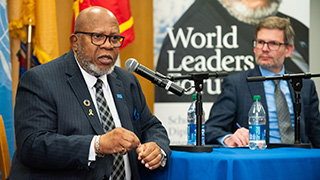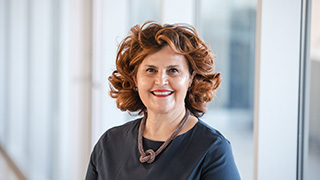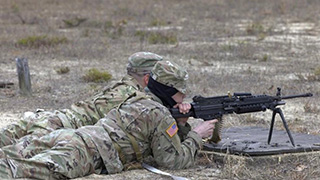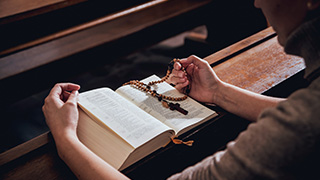Cooperman/Ross Endowed Professor Addresses G-20 Religion Forum (R20) in Bali
Wednesday, November 16, 2022
International Summit of Religious Leaders’ interfaith dialogue oriented to peace building
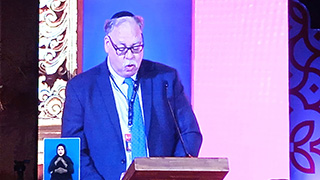
Rabbi Alan Brill at the podium, delivering his keynote address.
Rabbi Alan Brill, Ph.D., Cooperman/Ross Endowed Professor in honor of Sister Rose Thering, Graduate Program in Jewish-Christian Studies, Department of Religion, presented a keynote address at the Religion Forum (R20) International Summit of Religious Leaders, part of the G-20 taking place in Bali.
Rabbi Brill’s address, "Problematic Exclusivist texts," was among eight addresses presented to more than 200 distinguished religious leaders and politicians from Indonesia and abroad who attended.
Presenters included Mary Ann Glendon, Learned Hand Professor of Law, emerita, at Harvard University, and a former U.S. Ambassador to the Holy See, who discussed the universality of human rights. Archbishop Bashar Matti Warda, Chaldean Catholic Church (Iraq), presented "Warning from Iraq" described as "very moving and tragic" by Rabbi Brill, focusing on how Islam was used by the Islamic State to slaughter Christians and Yazidi. A virtual address from His Holiness Pope Francis was also delivered.
"I discussed how I wrote a widely influential book Judaism and Other Religions showing that Jewish texts do not present a sharp choice between traditional intolerant exclusivism or non-traditional secular pluralism. Rather, I presented a rich panorama of inclusive, exclusive, and universalist Jewish texts from one extreme to another."
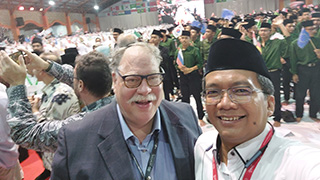
Rabbi Brill with Imam M Nur Hidayat
The R20 forum is one of Nahdlatul Ulama’s (NU) initiatives to present a moderate Islam to the world. The NU is the largest Islamic organization in the world with membership estimates range from 40 million to over 95 million. According to Yahya Cholil Staquf, chairman of the NU’s executive council, NU aims is for the forum to serve as a medium for prominent religious leaders to express their voices to form shared moral and spiritual values. The NU organized and hosted this conference, as well as setting the agenda.
Rabbi Brill shared that a remarkable transformation has been taking place in the Muslim world, a years-long shift towards pluralism and tolerance belying common assumptions about Islam. The NU Nahdlatul Ulama seeks to have spread a soft tolerant form of Islam as a form of soft diplomacy and increase of the role of Indonesia in the world.
"I grew up in an era which taught me a tolerant universal Judaism. I was never taught any intolerant texts or ideas. And I would have never expected their return in the 21st century. In the last decade, some of these intolerant texts have returned and my paper dealt with How should we deal with statements in traditional Jewish literature that are negative or discriminatory regarding non-Jews? I showed how the Jewish community stated that we should reject these exclusive statements," he said.
"I stated that Jews have barely begun to look at their attitudes toward other faith, albeit this reluctance was forged in an era of persecution. But they do not look at their own problematic and nasty text about gentiles. Love of one's own group should not be equated with the hatred of others."
He said, "Traditional religions travel heavy and do not throw texts away. They may think that they do not use a given problematic text anymore, so they lay it aside, but it returns. And in every generation, we may have to reread it again, and again."
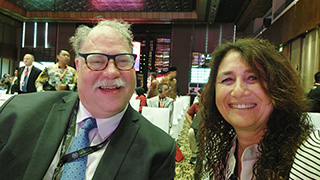
Rabbi Brill with Rabbi Silvina Chemen of Kehilat Beth El, the major Conservative congregation in Argentina, and in charge of Judaic Studies at the Schlichei Tzibur School.
"The R20 is categorized as an interfaith dialogue oriented to peace building. There are at least four goals through this paradigm: changing attitudes and perspectives of others, growing respect and understanding, expanding participation in activities, and building a framework for cooperation in taking action against the roots of conflict", explained Rabbi Brill. The R20 focuses on placing religion as a solution rather than a problem through raising internal problems in religion, interreligious relations, and seeking shared solutions to humanitarian problems.
It came out of the G20 annual forum, originally a meeting to respond to the financial crises which occurred in 1998 and 2008. The formation of G20 initially emerged from the expansion in the membership of G8 – eight countries that became the most significant actors in facing the financial crisis to become the G20 with the entrance of countries with emerging economies, such as China, India, and Brazil, and also an intergovernmental organization: European Union. The forum, which was originally aimed at dealing with economic issues, has grown to be more comprehensive and multidimensional.
Rabbi Brill met with religious leaders and religious authors from around the world, specifically those leading Islam, Hinduism, and Buddhism. They attended nightly cultural events to show the range of Indonesian culture from the Balinese, Javanese, and Buddhist.
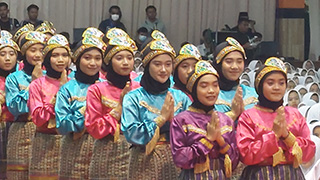
Students at the NU boarding school performing for the delegates.
"On the last night, they took us to a traditional Islamic boarding school with 20,000 students, operated by the NU. The students performed for us a spectacular show including renditions of Michael Jackson’s We are the World and John Lennon’s Imagine," he said.
Rabbi Brill summed up the thoughts he shared with his colleagues gathered together as peace builders.
"The important point is that the universalism that I was taught when I was in school can always be overturned in a later generation if we are not vigilant in teaching the universal parts of our traditions and openly rejecting the exclusive and prejudicial parts through sensitive contemporary readings," said Rabbi Brill. "In conclusion, fidelity to one’s own faith need not involve an adversarial attitude to people of other faiths. Creating an inclusive traditional approach that allows for working together is a much more powerful force for building civilization than working alone."
Categories: Faith and Service, Nation and World

